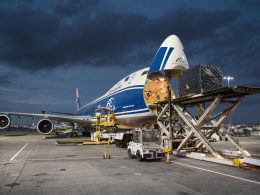The Sustainable Aviation Buyers Alliance (SABA) issued a first-of-its-kind request for proposals (RFP) aimed at significantly expanding the supply of next-generation sustainable aviation fuel (SAF), including power-to-liquid fuels and those derived from advanced biobased feedstocks. The initiative seeks to accelerate the scale-up of long-term SAF production capacity and drive investment into fuels with greater scalability and fewer feedstock limitations.
SABA, comprising more than 35 member companies across sectors such as finance, technology, consulting, and media, intends to facilitate forward-purchasing commitments ranging from 5 to 10 years. The goal is to secure sufficient demand to support a final investment decision (FID) on a new production facility for advanced SAF.
“The SAF market is growing, but the technologies needed to fully decarbonise aviation are still in their infancy,” said Kim Carnahan, CEO of the Centre for Green Market Activation and head of the SABA Secretariat. “Investment must happen now to ensure these technologies are ready to scale after 2030 and help aviation meet its net-zero goals.”
Despite recent progress, SAF currently accounts for less than 1% of total aviation fuel use, and most supply is derived from feedstocks such as used cooking oil, which are limited in long-term scalability. Next-generation SAF technologies—relying on renewable hydrogen, agricultural and forestry residues, or municipal solid waste—remain underdeveloped and underfunded. SABA’s latest RFP targets these fuel types specifically to catalyse the development of high-integrity, scalable supply solutions.
The RFP operates under a “book and claim” model, enabling corporate buyers to purchase SAF certificates (SAFc) that allow them to claim the emissions reductions in their climate disclosures, even if the physical SAF is used elsewhere. This model supports decarbonisation while bypassing logistical constraints in fuel delivery.
“Book and claim is the bridge between sustainable aviation fuel ambitions and real-world production,” said Bryan Fisher, Managing Director at RMI, a co-founder of SABA. “Mobilising corporate demand through this mechanism can fast-track innovation and investment, enabling the aviation sector to meet its climate targets.”
Since its inception in 2021, SABA has mobilised around $200 million in SAF investments through pilot and multi-year procurement initiatives. Its latest RFP aims to secure long-term offtake agreements that would enable SAF facilities to reach FID by 2026 and begin operations by 2030.
















